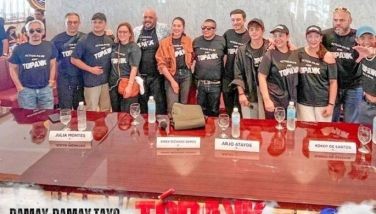How not to be "Minî" and other life's lessons
CEBU, Philippines - I was fortunate to score tickets to the Cebuano zarzuela “Minî” at SM City Cebu. I’ve always been proud to be a Cebuano and after being away from my beloved hometown for more than a decade for studies and work, this was a good way to re-introduce myself to the Cebuano culture and literature.
Perhaps, living away from home plus being a product of two ethnolinguistic backgrounds have seemingly diminished my knowledge of the native tongue, that I actually didn’t know what “Minî” meant in the Cebuano context. Speaking only colloquial Cebuano, I found the “Minî” experience truly meaningful and inspiring, especially after hearing original Visayan.
Watching “Minî,” in fact, was a case of many firsts for me. Actually three firsts.
It was my first time to watch a Cebuano zarzuela—yes, I’ve seen a few but none of which were in vernacular, and most touched on political issues in the early days. “Minî,” on the other hand, was permeated with philosophical themes—love and happiness, truth and self-worth—which remain relevant today, despite it being a play penned in the 1920’s by a notable Cebuano playwright-actor named Buenaventura “Tura” Rodriguez.
The story revolved around characters with different personalities. There’s Dr. Casas (Philogene Florita), the town doctor who diagnoses Don Felix Gomez’s (Jake Maningo) overall feeling of unwell as caused by his being a fraud, a “minî”, and urges the latter to step out of his bubble and expose himself to the realities of life. Don Gomez, who by assuming a new identity as the poor man Eling, discovers his true self, and discovers love with the charming and innocent Mayang (Yntel Beltran) in the process.
Then there’s Alipio (Nick Ampatin) and Inka (Jolen Lim), Mayang’s parents, whose opposing personalities completely complement their almost normal albeit strange union as husband and wife. Mayang’s sly brother Quintin (Gabriel Wong), and not-so-bright suitor Gorio (Alden Reambonanza), who made us laugh all throughout with their antics. Pascual (Lau Rogero), the ever-supportive father who only wants the best for his son, Gorio. And the loyal Azon (Marlinda Angbetic-Tan), the mayordoma of Don Felix Gomez, who showed strength and empathy. Distinct characters they all were, and they successfully engaged the audience towards the story and the morals being depicted.
It was also my first time to experience a Cebuano audience, which turned out to be quite a surprise. They were very expressive, as if watching television on a regular day. They reacted verbally when they wanted to.
I must say though that in other theaters I’ve been to, whispering, let alone talking (or reacting loudly) while a play/performance is ongoing, would warrant a stern shhhh from fellow theatergoers, if not special attention from ushers, who make sure the so-called Golden Rules of theater etiquette are followed.
Nevertheless, to me, more than a distraction, it was interesting to see the audience feedback, and the very present “inato” culture. Perhaps, Cebuanos, simply “at home”, hold up to their own nuances and emotions regarding traditions.
Lastly, it was my first time to be bombarded by lots of old Visayan vocabularies, starting from “diriyot”, “busabos”, “panuway”, to “mamatiis”, among others. The last word for instance, “mamatiis/manghimatiis” which means to wash the calves (batiis) thoroughly embodies the rich and unique Cebuano sensibilities, by which we all have concrete words for specific body parts.
Other examples include “manghinaw/manghunaw” for washing the hands, and “manghimasa” for washing our feet. Also, I was particularly charmed by the lilting tones of the Cebuano accent used by the performers, not to mention the balitaw-type songs of love aptly rendered. Indeed, as the anthropologist Michael Tan has said, there is much lyricism and elegance in Bisaya.
Listening to their voices, I got curious of the quaint town of Dumanjug, where “manananggots” abound. Dumanjug, blessed by both agricultural and coastal products, was the right setting for this stage drama.
After watching the play, I was told that to fully understand Cebuano and culture, it is best to read the Visayan version of the Bible, and to involve in the LUDABI. I am tempted to do this since I do not want to be called a “Minî” of my own language.
(Directed by Archie Modequillo, “Minî” is one of the highlights of the Arts Council of Cebu’s golden anniversary celebration this year. Plans are now underway for the zarzuela and its enduring message to be brought to towns and cities in and outside Cebu. – Ed.)
- Latest
- Trending



















